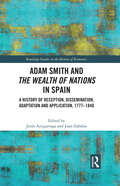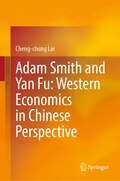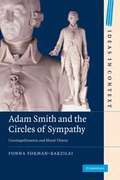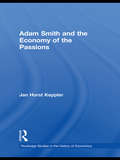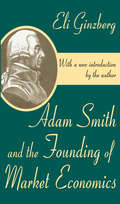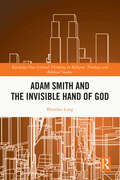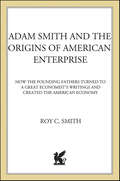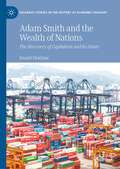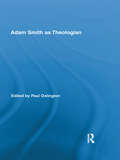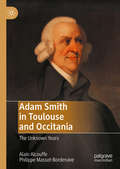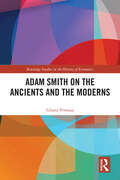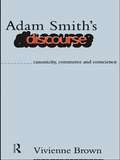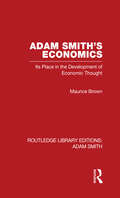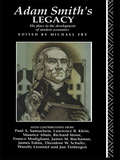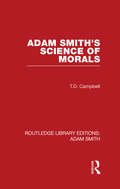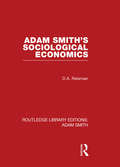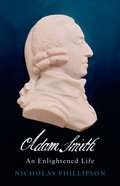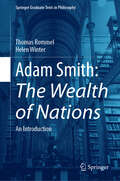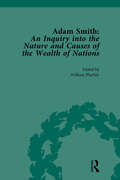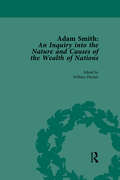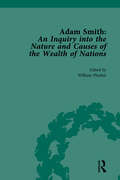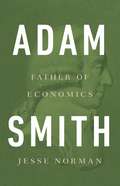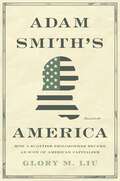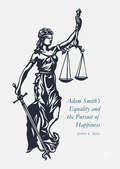- Table View
- List View
Adam Smith and The Wealth of Nations in Spain: A History of Reception, Dissemination, Adaptation and Application, 1777–1840 (Routledge Studies in the History of Economics)
by Jesús AstigarragaAdam Smith’s An Inquiry into the Nature and Causes of the Wealth of Nations was the product of the rich tradition of the Scottish Enlightenment but the book’s fame immediately spread across the whole of Europe. This book looks at the long journey of Smith’s ideas from Scotland to peninsular Spain, reconstructing in detail the reception, adaptation, interpretation, and application of Smith's central concepts from 1777 up to 1840. In light of methodological advances during the last two decades in the history of economic thought and the studies on the late Spanish Enlightenment and early Liberalism, the book tackles a series of significant issues and gaps in the historiography. In particular: this book sheds new light on the role of France as an intermediate step as the ideas spread from Britain southwards; the analysis draws not just on translations but also handwritten materials, book reviews, syntheses, summaries, plagiarism and rebuttals; a wide range of methods of dissemination are considered including the printing press and periodicals, parliamentary debates, academic chairs and societies; the role of individual translators and agents is given due prominence; the political interpretations of the Wealth of Nations and the ways in which the book was incorporated into the work of Spanish economists in the decades following publication are also considered. This book marks a significant contribution to the literature on the reception of Smith’s Wealth of Nations, studies of the Spanish Enlightenment and history of economic thought more broadly.
Adam Smith and Yan Fu: Western Economics in Chinese Perspective
by Cheng-chung LaiThis book examines at a static level how Adam Smith's The Wealth of Nations (1776) was introduced into China at the turn of the twentieth century. In a dynamic socio-economic context, Yan Fu (1854-1921) had The Wealth of Nations in mind as a prescription for China's "Wealth and Power". This book aims answer the question of whether The Wealth of Nations, a book which advocates laissez-faire, free trade, and minimum governance helpful for China with very different economic conditions and modes of thought to the West and goes on to reexamine Yan Fu's economic ideas through a modern economics perspective.
Adam Smith and the Circles of Sympathy: Cosmopolitanism and Moral Theory
by Fonna Forman-BarzilaiA broad-ranging study of Smith's views on moral judgement, humanitarian care, commerce, justice and international law.
Adam Smith and the Economy of the Passions (Routledge Studies In The History Of Economics Ser. #116)
by Jan Horst KepplerThe fertility of Adam Smith’s work stems from a paradoxical structure where the pursuit of economic self-interest and wealth accumulation serve wider social objectives. The incentive for this wealth accumulation comes from a desire for social recognition or "sympathy" – the need to recognise ourselves in our peers – which is the primary incentive for moderating and transforming our violent and egotistical passions. Adam Smith thus examines in detail the subliminal emotional structure underlying market behaviour. This new book by Professor Jan Horst Keppler presents an Adam Smith for the 21st century, more sceptical, searching and daring than he has ever been portrayed before. Without disputing its benefits, Professor Keppler’s original contribution explores the anarchic passions constantly threatening to destroy all social bounds, and how the overarching "desire for love" and social recognition provides the Smithian individual with the incentive to transform his unsocial passions into a desire for social advancement and economic wealth with the view to gaining the vital approbation of his peers. One of the most striking results of this new reading of Adam Smith is the latter’s insistence on the primacy of exchange value over use value. In other words, the quest for wealth is exclusively driven by the value it represents in the eyes of others rather than by any value in individual use. At a moment of crisis, where the link between "true" economic values and "virtual" financial values is more fragile than ever, Adam Smith’s work is a profoundly contemporary reminder that in the absence of personal, ethical groundings our economic actions are only grounded in the game of mirrors we play with our peers. This book will be of interest to postgraduate students and researchers in the History of Economics, or indeed any reader with an interest in the psychological foundations of a market economy and its theoretical representations as developed by Adam Smith.
Adam Smith and the Founding of Market Economics
by Eli Ginzberg"Business is a necessary evil that the moral leaders of mankind have tolerated but never condoned. At no time did they view with favor the pursuit of material gain. The Old Testament prophets proclaimed against the rapacity of the rich. Jesus scorned the money lenders. Luther had no kind words to say to the wealthy, nor did Calvin indulge the new bourgeoisie." Thus begins this fi rst book-length study of social philosopher and political economist Adam Smith's The Wealth of Nations. Adam Smith (1723-1790) was a Scottish-born thinker who served as both professor of logic and professor of moral philosophy at Glasgow University. While the publication of his philosophic treatise The Theory of Moral Sentiments at age thirty-six gave Smith fame, The Wealth of Nations, published in 1776, has established his lasting reputation. Recognized in its own day as an important and compassionate examination of economics, the book was praised by Thomas Jefferson for its contribution to the fi eld of economics. Smith wrote The Wealth of Nations for several reasons: he was disgusted with the business methods practiced by merchants and manufacturers, and he was concerned with improving the well-being of society. Refl ecting his own concerns about the contribution economics could make to the betterment of society, Eli Ginzberg published this study of Smith's humanitarian views on commerce, industrialism, and labor. Written for his doctoral degree at Columbia University, and originally published as The House of Adam Smith, the book is divided into two parts. The fi rst part reconstructs and interprets Smith's classic The Wealth of Nations, while the second part examines Smith as the patron saint and prophet of the successes of nineteenthcentury capitalism. Adam Smith and the Founding of Market Economics is a fascinating study, and contributes signifi cantly to our understanding of capitalism, free trade, the division of management and labor, and the history of world economics in the ninete
Adam Smith and the Invisible Hand of God (Routledge New Critical Thinking in Religion, Theology and Biblical Studies)
by Brendan LongThis book contributes to the ‘new view’ reading of Adam Smith, providing a historically and contextually rich interpretation of Smith’s thought. Smith built a moral philosophy on the foundations of a natural theology of human sociality. Examination of his life, relationship with David Hume and use of divine names shows that he retained a progressive form of Christian theism. The book interrogates the metaphor of the ‘invisible hand’ and highlights the importance of the religious dimension of Adam Smith’s thought for his moral philosophy, his jurisprudence and his economics. It reflects on the contemporary relevance of a theological reading of Smith and lays the ground for further inquiry between economic and religious perspectives.
Adam Smith and the Origins of American Enterprise
by Roy C. SmithAdam Smith was a Scottish professor of moral philosophy. He published his classic The Wealth of Nations in 1776, the year the American Revolution began. Smith became widely known for his ideas of free markets, laissez-faire commerce, and the "invisible hand." Yet English politicians, landed gentry, and the nobility paid little attention and enacted none of Smith's suggested reforms.The American colonies, however, began their existence as an independent nation in 1781 with no money, no industry, no banks, and deep in debt. The Founding Fathers-particularly Alexander Hamilton, James Madison, and Benjamin Franklin-turned to the ideas of Adam Smith to create and jump-start an economic system for America with both immediate and long-sustained results.This little-known but vital part of U.S. history is now revealed in Roy C. Smith's highly readable new book.
Adam Smith and the Wealth of Nations: The Discovery of Capitalism and Its Limits (Palgrave Studies in the History of Economic Thought)
by Daniel DiatkineThis book examines the work of Adam Smith and his interest in the science of the legislator. Smith’s criticism of the mercantile system and the political dimension of capitalism is discussed, alongside insight into what institutions he saw as necessary to transform the mercantile system into a system of natural freedom. Through insights into Smith’s analysis of the political threats of capital accumulation and the growth of inequality, the point at which he discovered capitalism is highlighted. This book aims to explore Smith’s belief set out in The Wealth of Nations that the mercantile system was a viable, if dangerous, economic model. It is relevant to students and researchers interested in the history of economic thought.
Adam Smith as Theologian (Routledge Studies in Religion)
by Paul OslingtonAdam Smith wrote in a Scotland where Calvinism, Continental natural law theory, Stoic philosophy, and the Newtonian tradition of scientific natural theology were key to the intellectual lives of his contemporaries. But what impact did these ideas have on Smith’s system? What was Smith’s understanding of nature, divine providence, and theodicy? How was the new discourse of political economy positioned in relation to moral philosophy and theology? In this volume a team of distinguished contributors consider Smith’s work in relation to its Scottish Enlightenment religious background, and offer stimulating theological interpretations of his account of fallible human nature, his providential account of markets, and his invisible hand metaphor. Adam Smith as Theologian it is a pioneering study which will alter our view of Smith and open up new lines of thinking about contemporary economics.
Adam Smith in Toulouse and Occitania: The Unknown Years
by Alain Alcouffe Philippe Massot-BordenaveThis book provides substantial background on what Adam Smith did during his stay in Toulouse and the Languedoc region of France during the 18th century. This is a crucial period in Smith’s life for at least two reasons: i) it is during this time that Smith began to work on The Wealth of Nations; and ii) it is generally understood that although some of his ideas about political economy were already formed before his trip, his encounters with many French political economists during his time in France helped him to further develop them. As such, this book provides a rich resource to further understanding Smith's world, his travel experiences and the people he met during this time and situates these within the broader context of Smith's life as a whole, and within the British aristocracy.This work will be of value to students and researchers in the history of economic thought, travel studies and Scottish studies.
Adam Smith on the Ancients and the Moderns (Routledge Studies in the History of Economics)
by Gloria VivenzaThe classics heavily influenced many aspects of European modern culture, yet it is not easy to trace their intellectual power on any author. In this volume, Gloria Vivenza takes on the impressive task of examining how philosophy, history, literature, politics, and ethics all played a part in shaping Adam Smith’s thought as a scholar, philosopher, and economist.This book will be of interest to advanced students and researchers in the history of economic thought, the history of philosophy, moral philosophy, political theory, and the Enlightenment.
Adam Smith's Discourse: Canonicity, Commerce and Conscience
by Vivienne BrownAdam Smith's name has become synonymous with free market economics; The Wealth of Nations is taken as the definitive account of the benefits of free competitive markets. Yet recent scholarship has challenged this view and given us a richer, more nuanced figure, steeped in the intricacies of enlightenment social and political philosophy. Adam Smith's Discourse both develops this literature and gives it a radical new extension by taking into account recent debates in literary theory.
Adam Smith's Economics: Its Place in the Development of Economic Thought (Routledge Library Editions: Adam Smith)
by Maurice BrownThe conventional received opinion of Adam Smith as an isolated figure, the founder of ‘modern’ economics, is thoroughly mistaken and misleading. This is the central premise of this book, first published in 1988, in which the author argues that by placing Smith’s work in its historical context, we discover profound continuities between Smith’s work and that of his predecessors, and his contemporaries. The effect is to re-orientate our perception of Smith and his achievement. No longer the single-handed champion of free markets and competition whose work revolutionised and completely redirected economics. He appears instead as a brilliant contributor to a deep-rooted contemporary debate, someone who can be placed in a line of thinkers that stretches between Machiavelli and Kant.
Adam Smith's Legacy: His Place in the Development of Modern Economics
by Michael FryFirst published in 1992. Routledge is an imprint of Taylor & Francis, an informa company.
Adam Smith's Science of Morals (Routledge Library Editions: Adam Smith)
by Tom CampbellThis critical exposition of Adam Smith’s Theory of Moral Sentiments, first published in 1971, gives an appreciation of Smith’s conception of scientific method as applied to the study of social phenomena. The work is placed in the context of Smith’s other writings including of course The Wealth of Nations, but making special use of the theory of scientific development contained in his posthumous work, Essays on Philosophical Subjects. By concentrating on Smith’s methodological approach to the study of society, this book provides an illuminating interpretation of his moral theory and defends it against any mistaken criticisms. It also includes a much needed analysis of the important differences between Smith’s ‘impartial spectator’ and the ‘ideal observer’ of modern ethical society. The result is a pointed study, bringing out the close connection between his moral, legal and ethical theories, which will be welcomed by all students of 18th century thought, specialists in moral theory, and the interested lay-reader.
Adam Smith's Sociological Economics (Routledge Library Editions: Adam Smith)
by David Alexander ReismanFirst published in 1976, this book provides an interdiciplinary study fo the thoughts of Adam Smith, showing it particular how the link between economic basis and social superstructure was central to his work. The work is split into six sections, dividing Smith's views along the following lines: 'methology', 'conduct and character', 'consumer behaviour', 'the upper classes', 'the lower classes', and finally 'the State'.
Adam Smith: An Enlightened Life
by Nicholas PhillipsonAdam Smith is celebrated all over the world as the author of The Wealth of Nations and the founder of modern economics. A few of his ideas - that of the 'Invisible Hand' of the market and that 'It is not from the benevolence of the butcher, the brewer, or the baker that we expect our dinner, but from their regard to their own interest' - have become icons of the modern world. Yet Smith saw himself primarily as a philosopher rather than an economist, and would never have predicted that the ideas for which he is now best known were his most important. This book, by one of the leading scholars of the Scottish Enlightenment, shows the extent to which The Wealth of Nations and Smith's other great work, The Theory of Moral Sentiments, were part of a larger scheme to establish a grand 'Science of Man', one of the most ambitious projects of the European Enlightenment, which was to encompass law, history and aesthetics as well as economics and ethics.Nicholas Phillipson reconstructs Smith's intellectual ancestry and formation, of which he gives a radically new and convincing account. He shows what Smith took from, and what he gave to, the rapidly changing and subtly different intellectual and commercial cultures of Glasgow and Edinburgh as they entered the great years of the Scottish Enlightenment. Above all he explains how far Smith's ideas developed in dialogue with those of his closest friend, the other titan of the age, David Hume. This superb biography is now the one book which anyone interested in the founder of economics must read.
Adam Smith: An Introduction (Springer Graduate Texts in Philosophy)
by Helen Winter Thomas RommelThis textbook provides an accessible introduction to Adam Smith, one of the most important economic thinkers. His seminal work The Wealth of Nations is a classic text in philosophy, social sciences and economics. This introduction puts Smith&’s central ideas on the division of labour, the invisible hand and the market into context. A careful analysis of key passages from Smith&’s writings explains how he arrived at a theory of society and the market that has become central to our understanding of human motives. The discussion of Smith&’s The Wealth of Nations is followed by sources from the 18th century that shaped Smith&’s analysis of human motives and propensities. This introduction is indispensable reading for an informed discussion of the mechanisms that govern human society. It provides an introduction to Adam Smith as one of the most astute thinkers of the 18th century, whose ideas shape modern concepts of the market, making it ideal as course material in courses such as economics, history, political sciences, sociology, literary studies, philosophy.
Adam Smith: Edited by William Playfair
by William Playfair William Rees-MoggFirst published in 1776, The Wealth of Nations is one of the great works of economic thought and a touchstone that has influenced generations of economists across the intervening centuries. The 1805 Playfair edition that is presented in this volume represents the first and most important early critical edition. Praised by Francis Ysidro Edgeworth for its 'acute criticism', the Playfair edition was the first to apply economic history to Smith's economic theory — raising issues which are still important in light of the 225 years of revolutions and inflations that have occurred since his death.The period between the original publication and 1805 saw an enormous development in Britain's wealth, the French Revolution, and rapid American and French inflation. William Playfair wrote insightful supplementary chapters and notes to discuss the aspects of these upheavals which he thought Smith would have wanted to address had he lived to see their effects. The edition reproduces the exact text from the corrected and expanded 1784 third edition, including the index, with Playfair's chapters and notes marked clearly as supplementary additions.
Adam Smith: Edited by William Playfair
by William Playfair William Rees-MoggFirst published in 1776, The Wealth of Nations is one of the great works of economic thought and a touchstone that has influenced generations of economists across the intervening centuries. The 1805 Playfair edition that is presented in this volume represents the first and most important early critical edition. Praised by Francis Ysidro Edgeworth for its 'acute criticism', the Playfair edition was the first to apply economic history to Smith's economic theory — raising issues which are still important in light of the 225 years of revolutions and inflations that have occurred since his death.The period between the original publication and 1805 saw an enormous development in Britain's wealth, the French Revolution, and rapid American and French inflation. William Playfair wrote insightful supplementary chapters and notes to discuss the aspects of these upheavals which he thought Smith would have wanted to address had he lived to see their effects. The edition reproduces the exact text from the corrected and expanded 1784 third edition, including the index, with Playfair's chapters and notes marked clearly as supplementary additions.
Adam Smith: Edited by William Playfair
by William PlayfairFirst published in 1776, The Wealth of Nations is one of the great works of economic thought and a touchstone that has influenced generations of economists across the intervening centuries. The 1805 Playfair edition that is presented in this volume represents the first and most important early critical edition. Praised by Francis Ysidro Edgeworth for its 'acute criticism', the Playfair edition was the first to apply economic history to Smith's economic theory — raising issues which are still important in light of the 225 years of revolutions and inflations that have occurred since his death.The period between the original publication and 1805 saw an enormous development in Britain's wealth, the French Revolution, and rapid American and French inflation. William Playfair wrote insightful supplementary chapters and notes to discuss the aspects of these upheavals which he thought Smith would have wanted to address had he lived to see their effects. The edition reproduces the exact text from the corrected and expanded 1784 third edition, including the index, with Playfair's chapters and notes marked clearly as supplementary additions.
Adam Smith: Father of Economics
by Jesse NormanA dazzlingly original account of the life and thought of Adam Smith, the greatest economist of all time Adam Smith (1723-1790) is now widely regarded as the greatest economist of all time. But what he really thought, and the implications of his ideas, remain fiercely contested. Was he an eloquent advocate of capitalism and individual freedom? A prime mover of "market fundamentalism"? An apologist for human selfishness? Or something else entirely? In Adam Smith, political philosopher Jesse Norman dispels the myths and caricatures, and provides a far more complex portrait of the man. Offering a highly engaging account of Smith's life and times, Norman explores his work as a whole and traces his influence over two centuries to the present day. Finally, he shows how a proper understanding of Smith can help us address the problems of modern capitalism. The Smith who emerges from this book is not only the greatest of all economists but a pioneering theorist of moral philosophy, culture, and society.
Adam Smith: The Adam Smith Review, Volume 5: Essays Commemorating The 250th Anniversary Of The Theory Of Moral Sentiments (The Routledge Philosophers #5)
by Samuel FleischackerAdam Smith (1723–1790) is widely regarded as one of the great thinkers of the Enlightenment period. Best-known for his founding work of economics, The Wealth of Nations, Smith engaged equally with the nature of morality in his Theory of Moral Sentiments. He also gave lectures on literature and jurisprudence, and wrote papers on art and science. In this outstanding philosophical introduction Samuel Fleischacker argues that Smith is a superb example of the broadly curious thinkers who flourished in the Enlightenment—for whom morality, politics, law, and economics were just a few of the many fascinating subjects that could be illuminated by naturalistic modes of investigation. After a helpful overview of his life and work, Fleischacker examines the full range of Smith’s thought, on such subjects as: epistemology, philosophy of science, and aesthetics the nature of sympathy moral approval and moral judgement virtue religion justice and jurisprudence governmental policy economic principles liberalism. Including chapter summaries, suggestions for further reading, and a glossary, Adam Smith is essential reading for those studying ethics, political philosophy, the history of philosophy, and the Enlightenment, as well as those reading Smith in related disciplines such as economics, law, and religion.
Adam Smith’s America: How a Scottish Philosopher Became an Icon of American Capitalism
by Glory M. LiuThe unlikely story of how Americans canonized Adam Smith as the patron saint of free marketsOriginally published in 1776, Adam Smith&’s The Wealth of Nations was lauded by America&’s founders as a landmark work of Enlightenment thinking about national wealth, statecraft, and moral virtue. Today, Smith is one of the most influential icons of economic thought in America. Glory Liu traces how generations of Americans have read, reinterpreted, and weaponized Smith&’s ideas, revealing how his popular image as a champion of American-style capitalism and free markets is a historical invention.Drawing on a trove of illuminating archival materials, Liu tells the story of how an unassuming Scottish philosopher captured the American imagination and played a leading role in shaping American economic and political ideas. She shows how Smith became known as the father of political economy in the nineteenth century and was firmly associated with free trade, and how, in the aftermath of the Great Depression, the Chicago School of Economics transformed him into the preeminent theorist of self-interest and the miracle of free markets. Liu explores how a new generation of political theorists and public intellectuals has sought to recover Smith&’s original intentions and restore his reputation as a moral philosopher.Charting the enduring fascination that this humble philosopher from Scotland has held for American readers over more than two centuries, Adam Smith&’s America shows how Smith continues to be a vehicle for articulating perennial moral and political anxieties about modern capitalism.
Adam Smith’s Equality and the Pursuit of Happiness
by John E. HillThis book examines Adam Smith's main principles in Wealth of Nations as the basis for effective policymaking. Adam Smith wanted to increase happiness through this formula for a good life: equality, liberty, and justice. Free market interpretations of Smith, the book argues, grossly misrepresent his thought, emphasizing only liberty and not also equality and justice. This book suggests policies that combine all three in order for happiness to be maximized.
